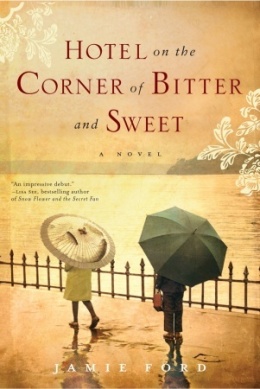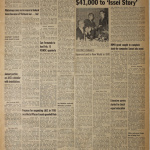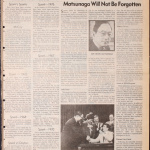Hotel on the Corner of Bitter and Sweet (book)
| Title | Hotel on the Corner of Bitter and Sweet |
|---|---|
| Author | Jamie Ford |
| Original Publisher | Ballantine Books |
| Original Publication Date | 2009 |
| WorldCat Link | http://www.worldcat.org/title/hotel-on-the-corner-of-bitter-and-sweet-a-novel/oclc/229027205/editions?referer=di&editionsView=true |
Bestselling 2009 novel by Jamie Ford about a doomed romance between a young Chinese American boy and a Japanese American girl in 1942 Seattle.
The book begins in 1986 with the discovery of the belongings of thirty-seven Japanese American families in the basement of Seattle's Panama Hotel, where they had left them for safekeeping prior to their forced removal in 1942. The discovery plunges Henry Lee, a recently widowed Chinese American, back forty plus years to a budding romance between him and a Japanese American classmate, Keiko Okabe, when they were twelve and the only two non-white students at their elementary school. Shunned or bullied by their classmates, they work together in the cafeteria and share a love of jazz, their first date coming at a nightclub where Henry's older friend and protector, Sheldon Thomas, plays. But Henry's father is an ardent Chinese nationalist, and Henry cannot tell his parents of his friendship. Henry helps Keiko and her family, agreeing to store some of their old family photos, leading to his parents' discovery of their friendship and his father's disowning of Henry. He sees the Okabes off when they are sent to Puyallup and sees them on weekends when he lands a job at the mess hall there. He and Sheldon even visit Minidoka , and Henry and Keiko pledge to write to each other. The letters eventually dry up, but Henry can never forget Keiko even after his happy marriage to Ethel, a Chinese American. The novel jumps back and forth between the war years and 1986, when Henry's son Marty and Marty's fiancé Samantha hear about Keiko for the first time, and Henry ponders his life as a retired widower.
Author Jamie Ford was born in Eureka, California, to a Chinese American father and white mother, but grew up in Ashland, Oregon, until age twelve, then in the Seattle, Washington, area. (His great-grandfather had anglicized the family name to "Ford" soon after his migration in 1865.) A successful graphic artist based in Montana, Ford was inspired to write the short story that would become Hotel by his father's stories of wearing an "I Am Chinese" button during World War II. The story was published in the prestigious literary journal Glimmer Train and subsequently extended into a novel that was purchased by Ballantine books in a "six-figure deal." Published in 2009, the book became a bestseller driven by positive reviews, word-of-mouth, feature placement by several large retailers—including Border's, Barnes and Noble, Costco, and Target—and many events and appearances by Ford. According to a USA Today article, the book had spent 89 weeks in the top 150 of the paper's bestseller list never going higher than #48, "signs of a book propelled by word-of-mouth recommendations, gradually passed on from reader to reader." By the end of 2013 it had sold more than a million copies and had been translated into thirty-four languages. Ford's second novel, Songs of Willow Frost , which is set in prohibition era Seattle and centers of a twelve-year-old orphan searching for a Chinese American movie star whom he thinks might be his mother, was published in 2013. [1]
Reviewers praised the appeal of the love story, the historical setting, and the multi-ethnic storyline. Joanna M. Burkhardt wrote that that the novel "... expertly nails the sweet innocence of first love, the cruelty of racism, the blindness of patriotism, the astonishing unknowns between parents and their children, and the sadness and satisfaction at the end of a life well lived. The result is a vivid picture of a confusing and critical time in American history." Tammar Stein wrote that "Ford does a masterful job creating a lost time and place. Seattle of the 1940s comes vividly alive, with a thriving jazz scene and a mix of cultures. Readers will see and feel the struggle between right and best as Japanese, Chinese, black and white bump, chafe and sometimes spontaneously combust under the strain of the constant fear of war." [2] Other reviewers found the plot predictable and/or contrived and characters "flat" and "one-dimensional." [3] Two reviewers also note that the twelve-year-old Henry seems too mature for his age, with the New York Times Book Review' s Alison McCulloch sardonically noting that "Henry is terribly earnest and seems always too old for his age—at 12, he has the caution and calm of a 56-year-old; at 56, Ford refers to him as "Old Henry Lee.'" [4]
The popularity of the novel has inspired several spin-off projects. Annie Lareau of the Book-It Repertory Theatre in Seattle adapted it into a play that premiered in 2012. It inspired musician Stephen Griggs to created "Panana Hotel Jazz," a music and spoken work performance that played at the Panama Hotel Tea Room in 2013. An "official walking tour" of the International District revisiting scenes from the book is offered through the Wing Luke Asian Museum of the Asian Pacific American Experience. While there have been discussions about turning the book into a movie, author Ford told Rafu Shimpo media columnist George Johnston that those discussions all foundered over the issue of producers wanting to change the lead character from Chinese American to white, something Ford refuses to allow. Finally, in 2017, producers Diane Quon and Joseph Craig acquired the film rights to the book—along with executive producer George Takei, planning to go into production in 2018 with a script authored by Ford. [5]
Find in the Digital Library of Japanese American Incarceration
Hotel on the Corner of Bitter and Sweet
This item has been made freely available in the Digital Library of Japanese American Incarceration , a collaborative project with Internet Archive .
Might also like: What the Scarecrow Said by Stuart David Ikeda; Southland by Nina Revoyr; The Legend of Fire Horse Woman by Jeanne Wakatsuki Houston
For More Information
Author website: http://www.jamieford.com .
Publisher website: http://www.randomhouse.com/book/54454/hotel-on-the-corner-of-bitter-and-sweet-by-jamie-ford .
Cooper, Julie. Teacher's Guide for Hotel on the Corner of Bitter and Sweet . Random House. http://www.randomhouse.com/catalog/teachers_guides/9780345505347.pdf .
Lau, Alan Chong. "Sweet Success." International Examiner , Oct. 7–20, 2009, p. 16.
Reviews
Bridges, Josephine. The Asian Reporter , Dec. 5, 2011, 15. [" Hotel on the Corner of Bitter and Sweet is a work of such wisdom and compassion that if enough people read it, it could change the world. Jamie Ford has done his part, and done it brilliantly. The rest is up to us."]
Burkhardt, Joanna M. Library Journal , Oct. 1, 2008, 56. ["… expertly nails the sweet innocence of first love, the cruelty of racism, the blindness of patriotism, the astonishing unknowns between parents and their children, and the sadness and satisfaction at the end of a life well lived."]
Carstensen, Angela. School Library Journal , May 2009, 140. ["While the novel is less perfect as literature than John Hamamura's Color of the Sea (Thomas Dunne, 2006), the setting and quietly moving, romantic story are commendable."]
Clouther, Kevin. Booklist , Nov. 15, 2008, 27. ["… doesn't have anything especially novel to say about a familiar subject (the interplay between race and family), he write earnestly and cares for his characters, who consistently defy stereotype."]
Cummins, Ann. KNAU Arizona Public Radio , Apr. 13, 2011. ["For its portrait of cultures at war in Seattle during the 1940s, Hotel on the Corner of Bitter and Sweet is a very worthwhile read."]
Kaneko, Lonny. International Examiner , Feb. 4–17, 2009, 12.
Kirkus Reviews , Oct. 15, 2008, 1086. ["The occasionally sappy prose tends to overtly express subtleties that readers would be happier to glean for themselves, but the tender relationship between the two young people is moving."]
McCulloch, Alison. New Time Times Book Review , Apr. 12, 2009, 26. ["Though the story of life in war-era Seattle and the detention of the city's Japanese families, including Keiko's is rich in detail, its characters feel thin."]
Pak, Samantha. " Love Story Set in Seattle's Historic Hotel Offers Wisdom. " Northwest Asian Weekly , Feb. 21–27, 2009. ["The plot of “Hotel” has the potential to become unrealistic to the point of being melodramatic, but Ford successfully strikes enough validity through its historical events and strong characters."]
Publisher's Weekly , Sept. 15, 2008, 40. ["The wartime persecution of Japanese immigrants is presented well, but the flatness of the narrative and Ford's reliance on numerous cultural clichés make for a disappointing read."]
Robinson, Ann. The Oregonian . Feb. 6, 2009. ["This is a simpler, less ambitious book than 'Snow Falling on Cedars,' but it achieves a lovely combination of romantic coincidence, historic detail and realism that is smooth and highly readable."]
Stein, Tammar. " Review: Jamie Ford's 'Hotel on the Corner of Bitter and Sweet' Captures West Coast Tension of World War II ." Tampa Bay Times , Oct. 9, 2009. ["Ford does a masterful job creating a lost time and place. Seattle of the 1940s comes vividly alive, with a thriving jazz scene and a mix of cultures."]
Upchurch, Michael. " Hotel on the Corner of Bitter and Sweet Recalls World War II-Era Seattle. " The Seattle Times , Feb. 6, 2009. ["But Ford's prose, while an easy read, can be a little clumsy at times. And the broad strokes with which he draws some of the story's minor characters detracts from its plausibility in certain passages."]
Footnotes
- ↑ Jamie Ford interview on the author's website, http://www.jamieford.com/interview/ ; Jamie Ford bio on Nelson Literary Agency website, http://nelsonagency.com/clients/jamie-ford/ ; Matthew Thornton, "Deals," Publishers Weekly , Sept. 3, 2007, p. 10, Academic Search Premier, EBSCOhost; Dick Donahue, "Paperback Bestsellers/Trade" Publishers Weekly , Oct. 4, 2010, p. 15, Academic Search Premier, EBSCOhost; Bob, Minzesheimer, "Novelist Jamie Ford Likes to 'Excavate the Past.'" USA Today , Sept. 12, 2013, Academic Search Premier, EBSCOhost; and Dick Donohue, "Popular First Novelist Lands #2." Publishers Weekly , Sept. 23, 2013, p. 14, Academic Search Premier, EBSCOhost, all accessed on January 31, 2014.
- ↑ Joanna M. Burkhardt, Library Journal , Oct. 1, 2008, p. 56; Tammar Stein, "Review: Jamie Ford's 'Hotel on the Corner of Bitter and Sweet' Captures West Coast Tension of World War II," Tampa Bay Times , Oct. 9, 2009, accessed on January 31, 2014 at http://www.tampabay.com/features/books/review-jamie-fords-hotel-on-the-corner-of-bitter-and-sweet-captures-west/1042022 ; see also Angela Carstensen, School Library Journal , May 2009, p. 140; Ann Robinson, The Oregonian . Feb. 6, 2009, http://blog.oregonlive.com/books/2009/02/fiction_review_hotel_on_the_co.html ; and Josephine Bridges, The Asian Reporter , Dec. 5, 2011, p. 15, http://www.asianreporter.com/reviews/2011/23-11bittersweat.htm , both accessed on January 31, 2014.
- ↑ On the plot: "The plot of Hotel has the potential to become unrealistic to the point of being melodramatic," Samantha Pak, "Love Story Set in Seattle's Historic Hotel Offers Wisdom," Northwest Asian Weekly , Feb. 21–27, 2009, http://www.nwasianweekly.com/2009/28_09/pages/shelf_hotel.html ; "... plot machinations... show some strain," Michael Upchurch, " Hotel on the Corner of Bitter and Sweet Recalls World War II-Era Seattle," The Seattle Times , Feb. 6, 2009, http://seattletimes.com/html/books/2008712524_br06bitter.html and Publishers Weekly , Sept. 15, 2008, p. 40. On the characters: "The characters in the novel did strike me as a bit flat. The heroes frequently become mouthpieces for political messages and the bullies are one-dimensional," Ann Cummins, KNAU Arizona Public Radio, Apr. 13, 2011. http://knau.org/post/hotel-corner-bitter-and-sweet ; "... its characters feel thin," Alison McCulloch, New Time Times Book Review , Apr. 12, 2009, p. 26, all accessed on January 31, 2014.
- ↑ McCulloch, New Time Times Book Review ; Kirkus Reviews , Oct. 15, 2008, p. 1086.
- ↑ Melissa Carter, "We Have To Do This Book: Adapting Hotel on the Corner of Bitter and Sweet," Book-It blog, Sept. 25, 2012, accessed on January, 31, 2014 at http://book-it.org/2012/09/we-have-to-do-this-book-an-interview-with-hotel-directoradapter-annie-lareau/ ; Wing Luke Museum website, http://wingluke.org/tours.htm ; George Toshio Johnston, "Into the Next Stage: Ford Finds Asian Americans Can't Drive Movies." Rafu Shimpo , June 21, 2012, accessed on January, 31, 2014 at http://www.rafu.com/2012/06/into-the-next-stage-ford-finds-asian-americans-cant-drive-movies/ ; Moira Macdonald, "'Hotel on the Corner of Bitter and Sweet' Movie on the Way," Seattle Times , Sept. 6, 2017, https://www.seattletimes.com/entertainment/movies/hotel-on-the-corner-of-bitter-and-sweet-movie-on-the-way/ , accessed on Jan. 24, 2018.
Last updated Feb. 24, 2021, 5:21 p.m..

 Media
Media

